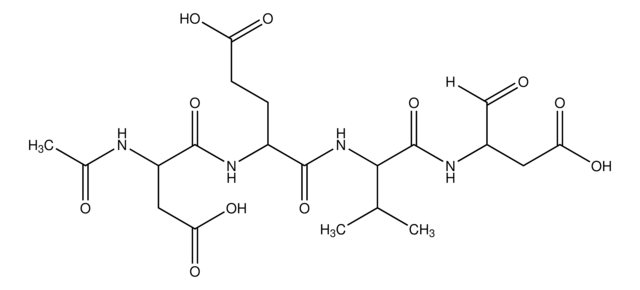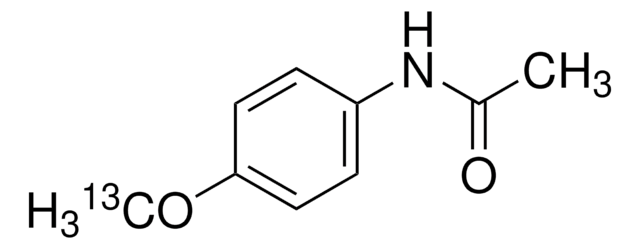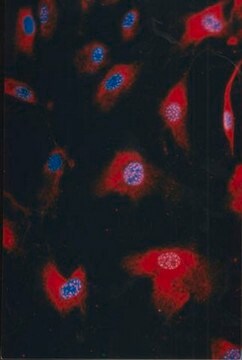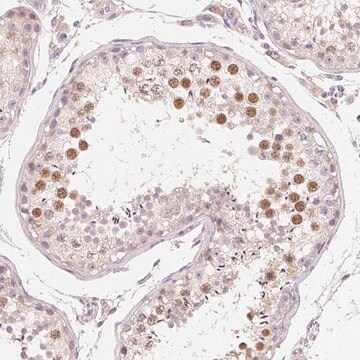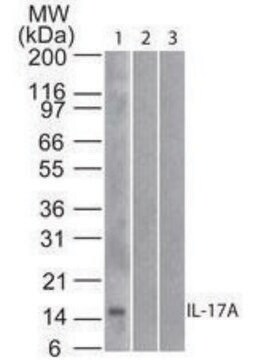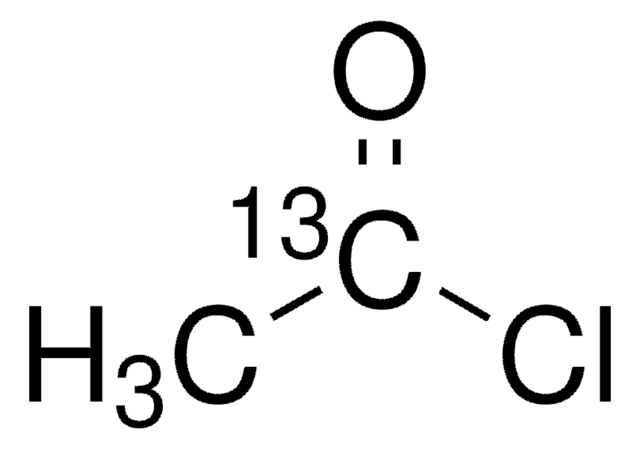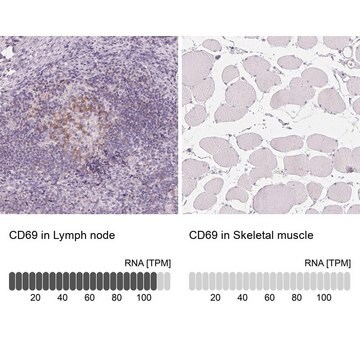SRP4178
IL-17A from rat
recombinant, expressed in E. coli, ≥95% (SDS-PAGE), ≥95% (HPLC)
Synonym(s):
Ctla8, IL17, IL17a
Sign Into View Organizational & Contract Pricing
All Photos(1)
About This Item
Recommended Products
biological source
rat
recombinant
expressed in E. coli
assay
≥95% (HPLC)
≥95% (SDS-PAGE)
form
lyophilized
potency
30 ng/mL
mol wt
~30 kDa
packaging
pkg of 10 μg
storage condition
avoid repeated freeze/thaw cycles
impurities
endotoxin, tested
NCBI accession no.
UniProt accession no.
shipped in
wet ice
storage temp.
−20°C
Gene Information
rat ... Il17a(25465)
General description
IL-17A (interleukin 17A) is the first cytokine member of the family composed of IL-17A-F. These cytokines are mainly produced by activated CD4+ (cluster of differentiation) T cells. IL-17A is predominantly synthesized by T-helper (Th)-17 lymphocytes, γδ T cells (γδ-17), cytotoxic CD8+ T cells (Tc17), natural killer T (NKT) cells, and neutrophils.
Biochem/physiol Actions
IL-17A (interleukin 17A) acts as a regulator of immune responses in inflammatory disorders, and acts as a potent pleiotropic proinflammatory cytokine where it promotes the release of other pro-inflammatory cytokines from a variety of cells. This cytokine is linked with pain, and IL-17A and IL-17A+ T cells are found in patients with arthritic pain, and in induced animal models of sciatic nerve, and optic nerve injury with neuropathic pain. This protein is thought to be involved in myocardial remodeling and fibrosis, where it promotes the synthesis of collagens and matrix metalloproteinases (MMPs) and activates cardiomyocyte apoptosis.
Recombinant rat IL-17 produced from Escherichia coli is a homodimeric, non-glycosylated polypeptide containing 268 amino acids and has a molecular weight of 30kDa.
Recombinant rat IL-17 produced from Escherichia coli is a homodimeric, non-glycosylated polypeptide containing 268 amino acids and has a molecular weight of 30kDa.
Physical form
Lyophilized (from 10 mM Sodium Citrate, pH 3.0).
Reconstitution
Centrifuge the vial prior to opening. Avoid freeze-thaw cycles.
Reconstitute in water to a concentration of 0.1-1.0 μg/μL (Note: Gently pipetting to dissolve). The solution can then be diluted into other aqueous buffers.
Certificates of Analysis (COA)
Search for Certificates of Analysis (COA) by entering the products Lot/Batch Number. Lot and Batch Numbers can be found on a product’s label following the words ‘Lot’ or ‘Batch’.
Already Own This Product?
Find documentation for the products that you have recently purchased in the Document Library.
Ting Li et al.
Frontiers in immunology, 9, 1118-1118 (2018-06-12)
Pneumocystis pneumonia (PCP) remains a severe complication with high mortality in immunocompromised patients. It has been well accepted that CD4+ T cells play a major role in controlling Pneumocystis infection. Th9 cells were the main source of IL-9 with multifaced
Natália Ketelut-Carneiro et al.
PLoS pathogens, 15(8), e1007990-e1007990 (2019-08-20)
The granulomatous lesion resulting from infection with the fungus Paracoccidioides brasiliensis is characterized by a compact aggregate of mature cells, surrounded by a fibroblast- and collagen-rich content. Granuloma formation requires signaling elicited by inflammatory molecules such as members of the
Lisa Wolf et al.
American journal of physiology. Lung cellular and molecular physiology, 311(5), L1015-L1022 (2016-10-04)
Lung epithelial cells are suggested to promote pathogen-induced pulmonary inflammation by the release of chemokines, resulting in enhanced recruitment of circulating leukocytes. Recent studies have shown that the interleukin-17C (IL-17C) regulates innate immune functions of epithelial cells in an autocrine
IL-17 contributed to the neuropathic pain following peripheral nerve injury by promoting astrocyte proliferation and secretion of proinflammatory cytokines.
Sun C et al
Molecular Medicine Reports, 15(1), 89-96 (2017)
Baraa Noueihed et al.
Frontiers in cell and developmental biology, 9, 630645-630645 (2021-02-09)
Ischemic retinopathies (IRs), such as retinopathy of prematurity and diabetic retinopathy, are characterized by an initial phase of microvascular degeneration that results in retinal ischemia, followed by exaggerated pathologic neovascularization (NV). Mesenchymal stromal cells (MSCs) have potent pro-angiogenic and anti-inflammatory
Our team of scientists has experience in all areas of research including Life Science, Material Science, Chemical Synthesis, Chromatography, Analytical and many others.
Contact Technical Service
